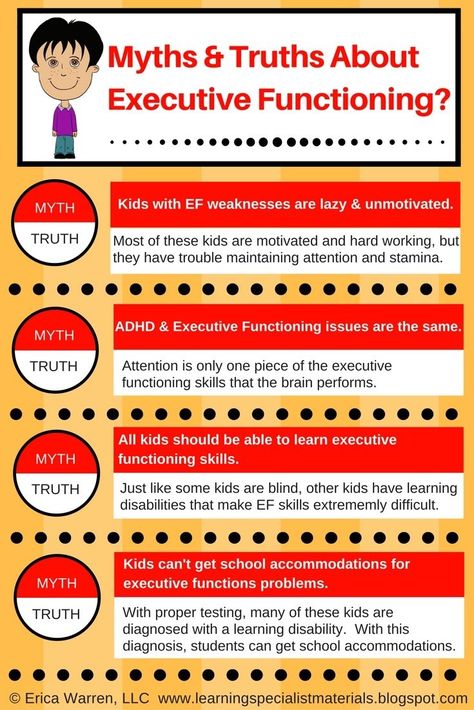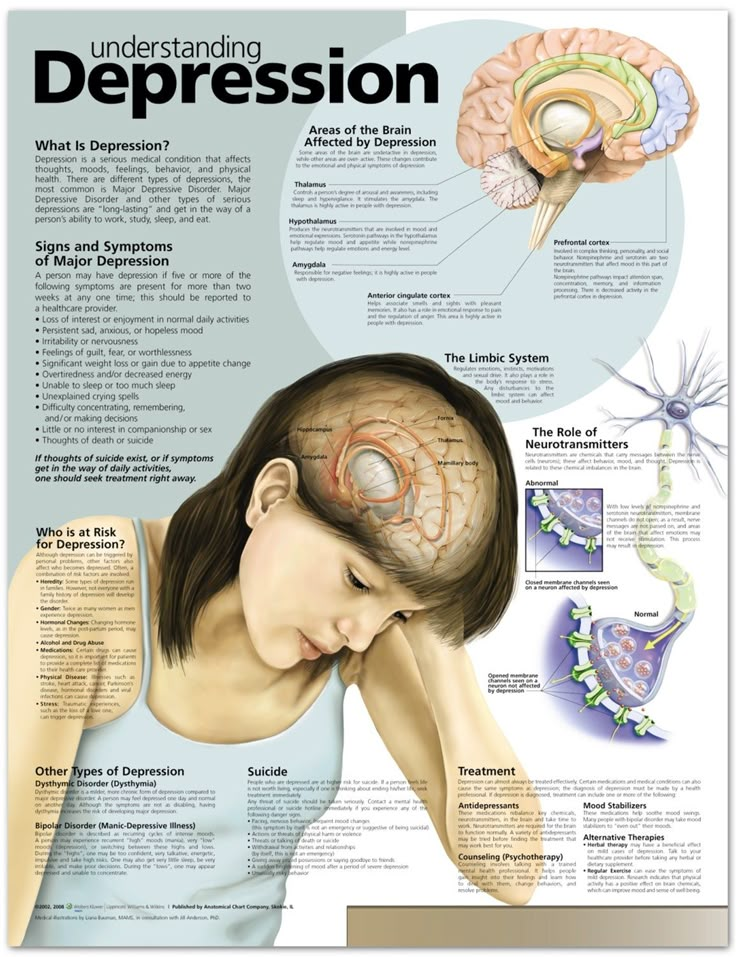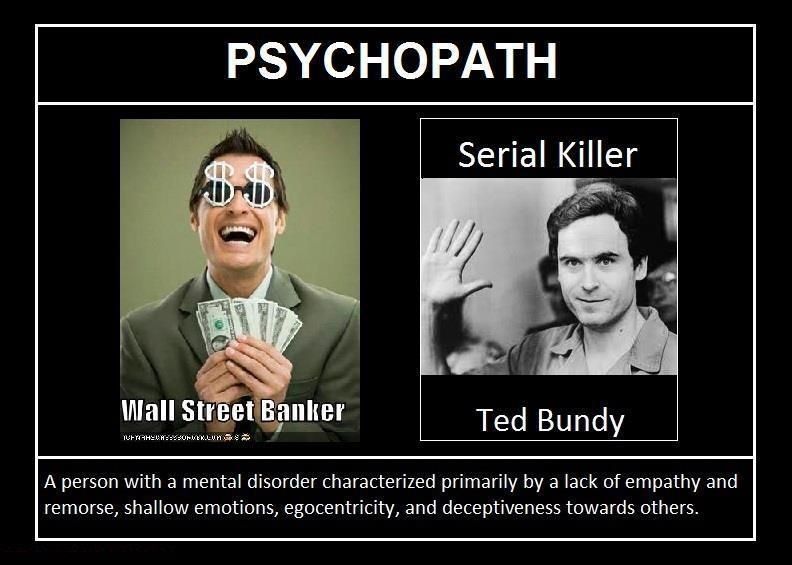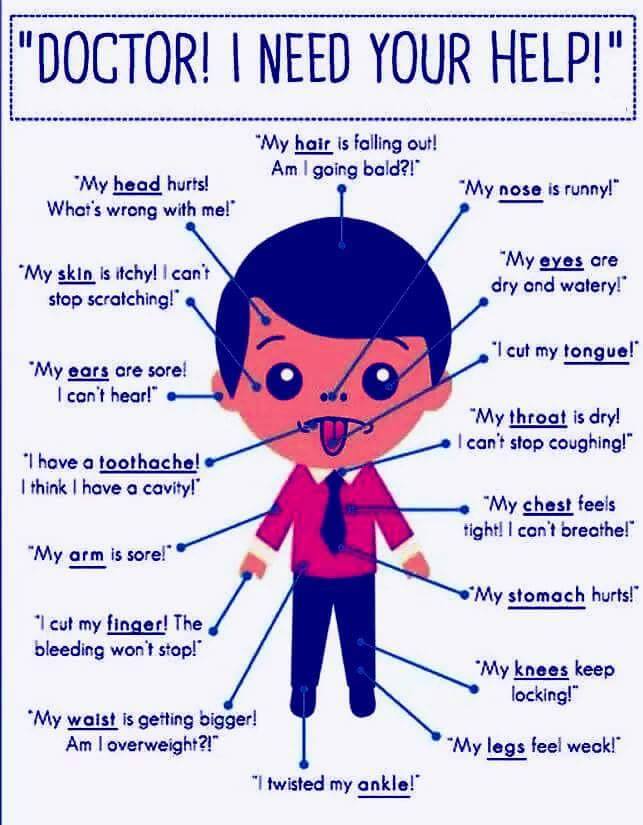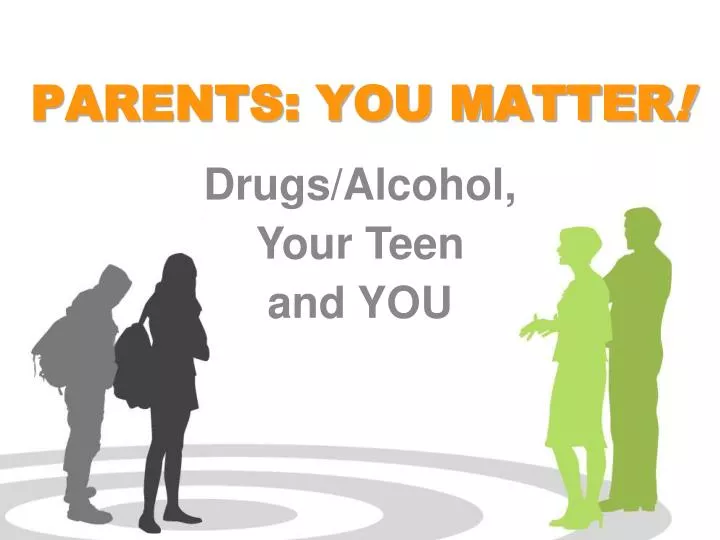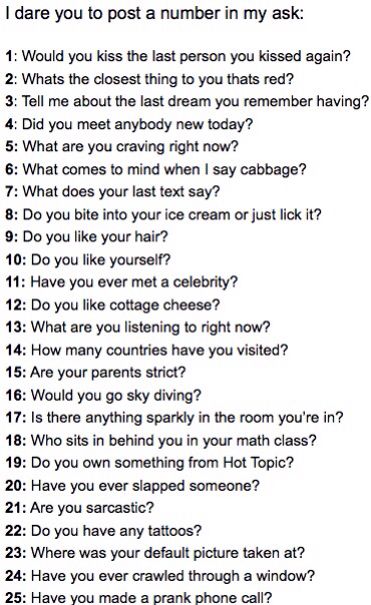Executive functioning issues
What Is Executive Dysfunction? Sign and Symptoms of EFD
What is Executive Dysfunction?
Executive dysfunction is a term used to describe the range of cognitive, behavioral, and emotional difficulties which often occur as a result of another disorder or a traumatic brain injury. Individuals with executive dysfunction struggle with planning, problem-solving, organization, and time management.
Children and adults with executive functioning problems struggle to organize materials, regulate emotions, set schedules and stick with tasks. They misplace papers, reports, and other school materials. They might have similar problems keeping track of their personal items or keeping their bedroom organized.
For children, behavior modification programs like token systems and daily report cards generally work well, however kids with ADHD get bored with token systems unless they collaborate on creating them. Similarly, daily report cards, while initially helpful, may end up making them feel bad about themselves when they don’t succeed, thus creating a negative reinforcement loop.
Cognitive behavioral therapy (CBT) is often helpful because it offers interventions in the moment.
If you think you might have an executive dysfunction, take one of these self-tests.
- Executive Dysfunction Test for Children
- Executive Dysfunction Test for Adults
What Is Executive Functioning?
Broadly speaking, executive functioning refers to the cognitive and mental abilities that help people engage in goal-directed action. They direct actions, control behavior, and motivate us to achieve our goals and prepare for future events. People with executive dysfunction struggle to organize and regulate their behavior in ways that will help them accomplish long-term goals.
Attention deficit disorder (ADHD or ADD) and executive functions are tightly linked, but far from synonymous. We all have executive functioning strengths and challenges that affect the attention, learning, work, and relationships. However, for those with ADHD, EF challenges are more severe and more numerous than for those without it.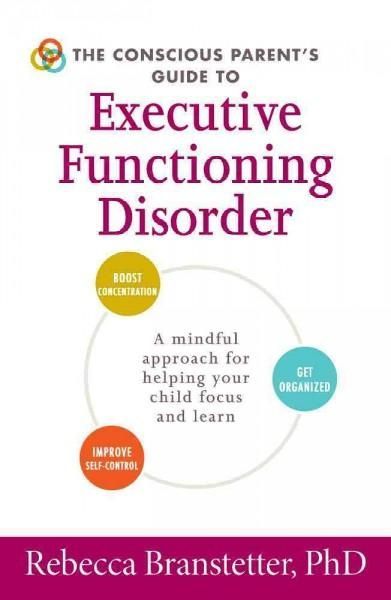
The seven major types of self-regulation associated with executive functioning are as follows:
- Self-Awareness: commanding self-directed attention
- Self-Restraint: inhibiting yourself
- Non-Verbal Working Memory: holding things in your mind to guide behavior
- Verbal Working Memory: retaining internal speech
- Emotional: using words and images along with self-awareness to alter how you feel about things
- Self-Motivation: motivating yourself to do things when no outside consequences exist
- Planning and Problem Solving: finding new approaches and solutions
[Download: Executive Skills Checklist for Parents and Teachers]
How Do Executive Functions Develop?
The abilities associated with executive functioning don’t all develop at once, but rather in a sequence — one skill building atop the next.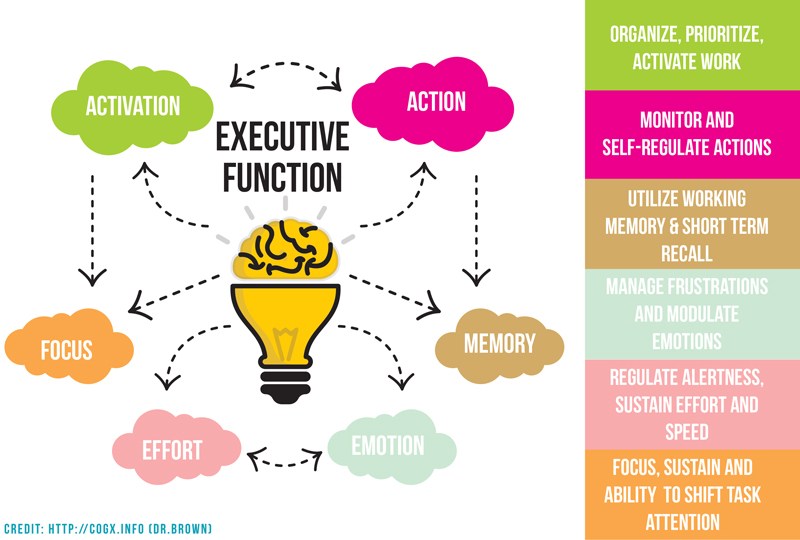 All of the executive functions interact with each other, and impact how individuals regulate their behavior to create positive future outcomes.
All of the executive functions interact with each other, and impact how individuals regulate their behavior to create positive future outcomes.
Executive functions begin developing by age two, and are fully developed by age 30. People with ADHD often are 30 to 40 percent delayed in development, which makes them more likely to act motivated by short-term rather than longer-term goals.
The back of the brain is where you store information that is already learned. The front part of the brain is where you use this information to be socially effective and succeed in life. This prefrontal cortex mediates executive functioning and it contains four major circuits.
- The “what” circuit controls working memory, helping you execute plans, goals, and specific steps needed to complete a project.
- The “when” circuit helps you organize the order in which you complete activities, and address timelines.
- The “why” circuit controls emotions — what you think about, and how you feel.
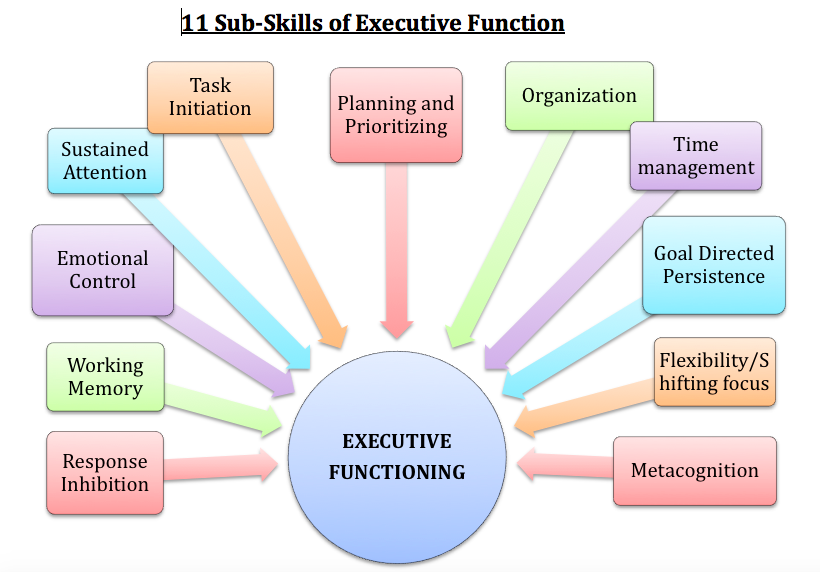
- The fourth “how” circuit controls self-awareness of your feelings and experiences.
People with executive functioning challenges and/or ADHD may experience impairments in one or more of these circuits and, therefore, their symptoms may touch memory, planning, emotional regulation, and/or social skills.
Read on to learn more about executive functions, and what therapies and interventions can help strengthen them. Consult with a physician if you recognize the symptoms below in your or your child.
Executive Dysfunction Symptoms
People with EF difficulties may experience the following symptoms:
- time blindness, or an inability to plan for and keep in mind future events
- difficulty stringing together actions to meet long-term goals
- trouble organizing materials and setting schedules
- trouble controlling emotions or impulses
- difficulty analyzing or processing information
Executive functions allow people to do the following:
- Analyze a task
- Plan how to address the task
- Organize the steps needed to carry out the task
- Develop timelines for completing the task
- Adjust or shift the steps, if needed, to complete the task
- Complete the task in a timely way
When a person has weak executive functions in certain areas, he or she may have trouble analyzing, planning, organizing, scheduling, and completing tasks.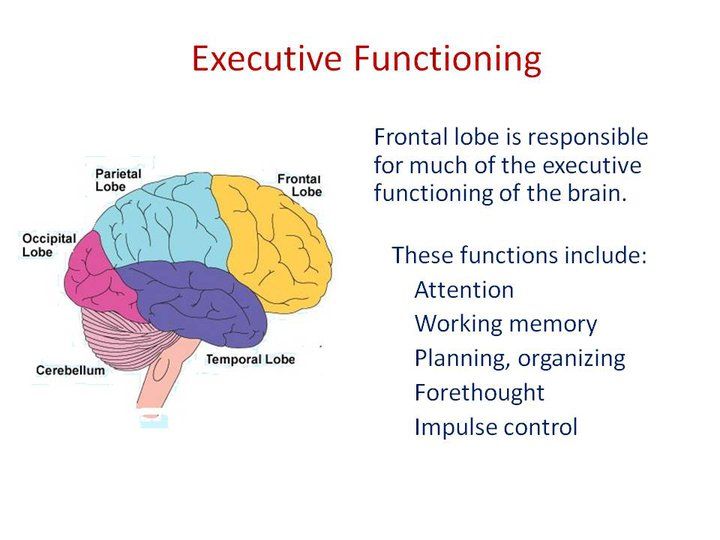 People with executive dysfunction and/or ADHD commonly lack the ability to handle frustration, start and finish tasks, recall and follow multi-step directions, stay on track, self monitor, and balance tasks (like sports and academic demands). Remediating the area of deficit reduces academic or work difficulties.
People with executive dysfunction and/or ADHD commonly lack the ability to handle frustration, start and finish tasks, recall and follow multi-step directions, stay on track, self monitor, and balance tasks (like sports and academic demands). Remediating the area of deficit reduces academic or work difficulties.
Types of Executive Dysfunction
There are not multiple types of executive dysfunction.
Executive Function and ADHD
ADHD is a biologically based disorder and a developmental impairment of executive functions – the self-management system of the brain. While most people with ADHD will experience many areas of executive function impairment, people can have executive dysfunction without ADHD.
The following six clusters of executive functions tend to be impaired in individuals with ADHD:
- Activation: organizing tasks and materials, estimating time, getting started
- Focus: finding, sustaining, and shifting attention as needed
- Effort: regulating alertness, sustaining motivation and processing speed
- Emotion: managing frustration and modulating feelings
- Memory: using working memory and accessing recall
- Action: monitoring and regulating physical activity
Russell Barkley, Ph. D., who has been at the forefront of exploring the relationship between executive dysfunction and ADHD, says, “It is not that the individual does not know what to do. It is that somehow it does not get done.”
D., who has been at the forefront of exploring the relationship between executive dysfunction and ADHD, says, “It is not that the individual does not know what to do. It is that somehow it does not get done.”
Executive Dysfunction Causes
Executive dysfunctions can be the result of heredity, especially in ADHD but they can also result from damage to the prefrontal cortex, in vitro exposure to substance use, trauma or severe neglect. A study found that people with disorders, diseases, or injuries that damage that area of the brain are more prone to difficulties with executive functioning1.
Evaluating Executive Function Difficulties
An executive function evaluation typically begins by ruling out other conditions with similar symptoms. The most common evaluation is the Behavior Rating Inventory of Executive Function (BRIEF), a written survey that kids/young adults, parents, and teachers complete to assess executive functioning. It comprises 86 questions designed to pinpoint the biggest area of difficulty.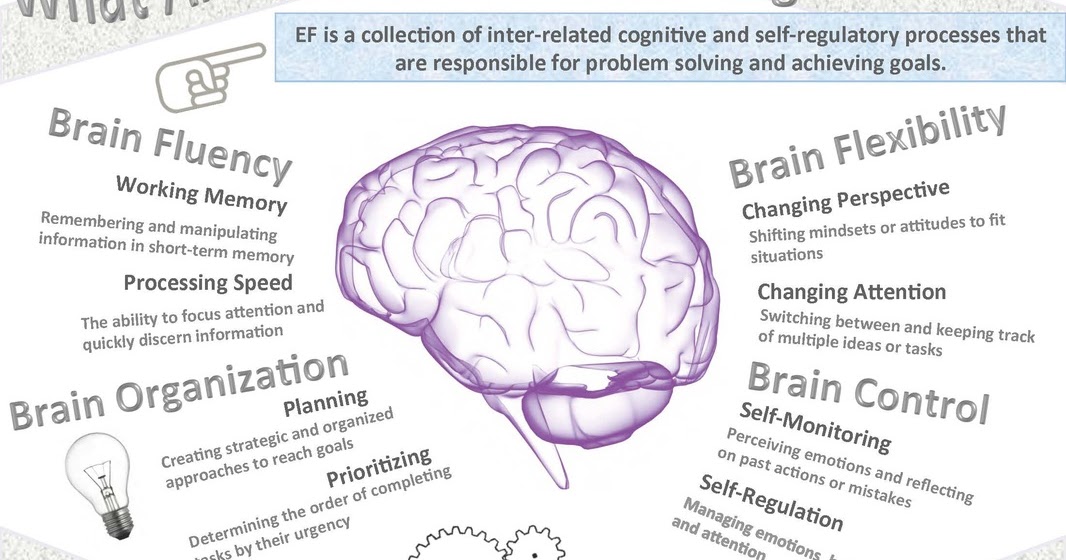 Additional evaluations include:
Additional evaluations include:
- Conners 3: a rating scale that evaluates ADHD and EF using parent, self, and teacher reports
- Barkley Deficits in Executive Functioning Scale (BDEFS) for Adults: assesses EF using self and other reports
- Comprehensive Executive Function Inventory (CEFI): compares a person to a norm group using parent, teacher, and self-report assessments
Executive functions are typically taxed during the transitions to 6th and 9th grade, when school structures and schedules change dramatically, and academic expectations increase. Parents and teachers often don’t understand why kids can’t work independently on an assignment, and assume they’ll “pick up” the necessary skills. It’s important to start helping kids with executive dysfunctions early, and to acknowledge the associated problems so that kids don’t feel stupid or lazy.
Treatment Options for Executive Dysfunction
Experts recommend a range of strategies to help strengthen the areas of weakness associated with executive dysfunction.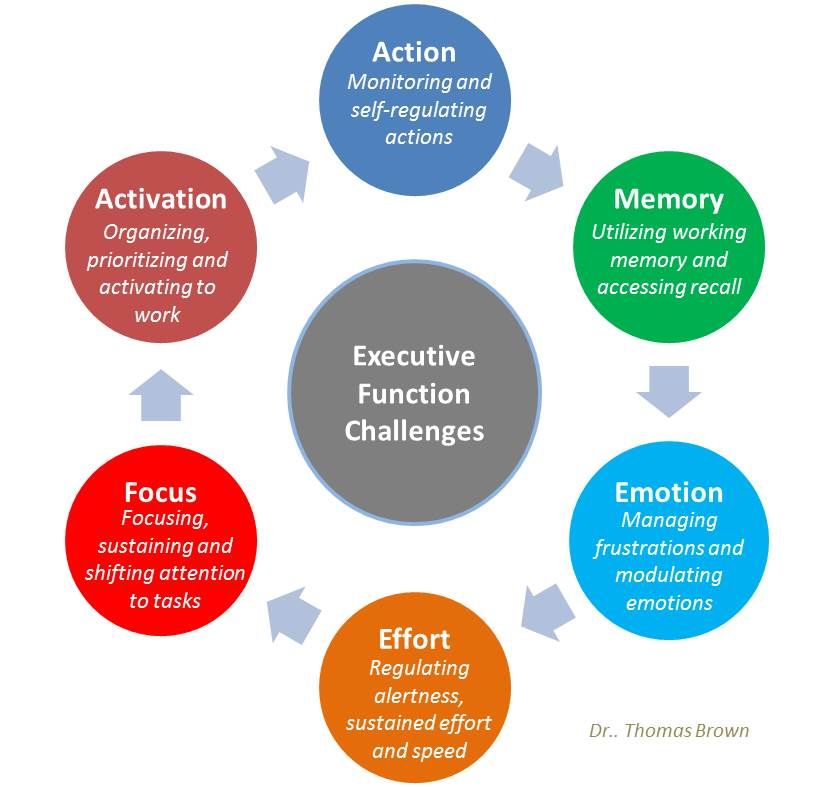 The first method uses occupational or speech therapists, psychologists, or reading tutors to learn how to work around problem areas. Cognitive behavioral therapy, used in combination with medication to treat any coexisting conditions like ADHD, is very effective at treating executive functioning deficits including problems with inhibition, emotion regulation, time management, and planning.
The first method uses occupational or speech therapists, psychologists, or reading tutors to learn how to work around problem areas. Cognitive behavioral therapy, used in combination with medication to treat any coexisting conditions like ADHD, is very effective at treating executive functioning deficits including problems with inhibition, emotion regulation, time management, and planning.
Many experts recommend redesigning the environment to help people with executive dysfunctions to stay on task. For example, adults may compensate for working memory deficits by making information external – using cards, signs, symbols, sticky notes, lists, journals, and apps. Patients can likewise make time external by using clocks, timers, computers, counters, and other devices that track time intervals. Use external motivation, like points systems, being accountable to others at work and school, daily school report cards – anything that reinforces accomplishing goals.
Executive Dysfunction: Next Steps
- Free Download: Common Executive Functioning Challenges — and Solutions
- Take: The Executive Dysfunction Symptom Test for Adults
- Read: When Executive Functions Falter and Fail in Kids with ADHD
FROM OUR SPONSOR
WatchMinder is the only vibrating reminder watch invented by a child psychologist! Click here to learn how it can keep you or your child on task and on time.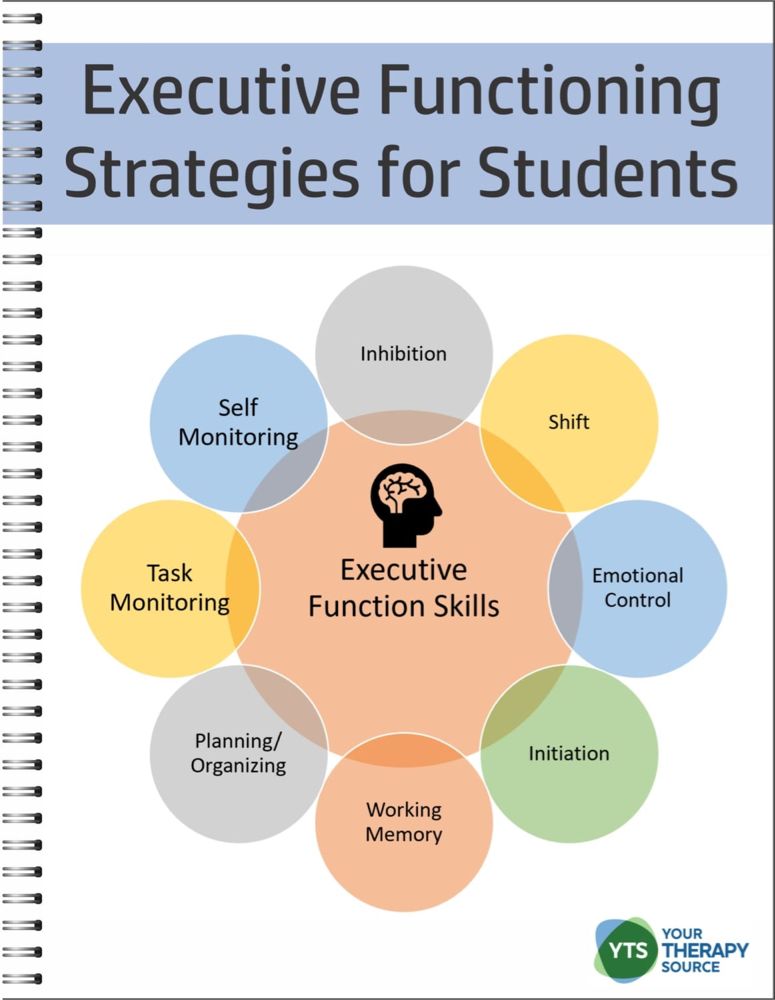 Save $15 with SCHOOLATHOME code.
Save $15 with SCHOOLATHOME code.
0 Friedman, Naomi P., et al. “Individual Differences in Executive Functions Are Almost Entirely Genetic in Origin.” Journal of Experimental Psychology: General, 137(2): 201–225., May 2008, doi: 10.1037/0096-3445.137.2.201.
1 Elliot, Rebecca. “Executive functions and their disorders: Imaging in clinical neuroscience.” British Medical Bulletin, vol. 65, no. 1, March 2003, pp. 49-59, doi: 10.1093/bmb/65.1.49.
Previous Article Next Article
Symptoms in Adults with ADHD
Executive Dysfunction in Adults
Like those with attention deficit hyperactivity disorder (ADHD or ADD), people with executive dysfunctions often experience time blindness, or an inability to plan for and keep in mind future events that aren’t in the near-term. They also have difficulty stringing together actions to meet long-term goals. This is not an attention problem in the present tense, but rather a sustained attention problem.
They also have difficulty stringing together actions to meet long-term goals. This is not an attention problem in the present tense, but rather a sustained attention problem.
[Related Self-Test: ADHD in Adults]
When a person has weak executive functions in certain areas, he or she may have trouble analyzing, planning, organizing, scheduling, and completing tasks. People with executive dysfunction and/or commonly lack the ability to handle frustration, start and finish tasks, recall and follow multi-step directions, stay on track, self monitor, and balance tasks (like sports and academic demands). Remediating the area of deficit reduces academic or work difficulties. If this sounds familiar, take this self-test.
This self-test is designed to determine whether you show signs of executive dysfunction. If you have concerns about executive dysfunction, see a health professional for a thorough evaluation. This self-test is for personal use only.
Do you find it hard to do things that aren't necessary or highly stimulating?
Very Often
Often
Sometimes
Rarely
Never
Do you let go of anger as quickly as it came?
Very Often
Often
Sometimes
Rarely
Never
Do you become frustrated when things don’t go as planned and can you quickly become angry?
Very Often
Often
Sometimes
Rarely
Never
Do you struggle to get a handle on clutter? Does your personal space get messy with piles of papers and miscellaneous items?
Very Often
Often
Sometimes
Rarely
Never
Do you forget appointments and do you typically run late?
Very Often
Often
Sometimes
Rarely
Never
At least once a day do you lose or misplace items—for example, keys, wallet, purse, or a cell phone?
Very Often
Often
Sometimes
Rarely
Never
Do you forget things, even when they are important to you?
Very Often
Often
Sometimes
Rarely
Never
Do you become absorbed in things or tasks that interest you—sometimes to the point of forgetting about people around you or other obligations?
Very Often
Often
Sometimes
Rarely
Never
Do you have trouble completing multiple-step tasks and moving from one task to another?
Very Often
Often
Sometimes
Rarely
Never
Do you start tasks with enthusiasm but lose interest quickly?
Very Often
Often
Sometimes
Rarely
Never
Do you have difficulty figuring out what is most important or what you should start with given a list of things to do?
Very Often
Often
Sometimes
Rarely
Never
Do you waste time trying to decide what to do first?
Very Often
Often
Sometimes
Rarely
Never
Are you easily distracted by things you see or hear?
Very Often
Often
Sometimes
Rarely
Never
Do you have trouble getting started or initiating tasks?
Very Often
Often
Sometimes
Rarely
Never
Do you say “I will do it later” and then forget all about it?
Very Often
Often
Sometimes
Rarely
Never
Do you have trouble following conversations because you are distracted or because you are trying to remember what you wanted to say?
Very Often
Often
Sometimes
Rarely
Never
(Optional) Would you like to receive your executive function disorder symptom test results — plus more helpful resources — via email from ADDitude?
Sign me up for your Adult ADHD newsletter.
Can’t see the self-test questions above? Click here to open this test in a new window.
Executive Dysfunction in Adults: Next Steps
1. Take This Test: ADHD Symptoms in Adults
2. Take This Test: Do You Have a Working Memory Deficit?
3. Research Treatments for Executive Dysfunction
4. Read Executive Dysfunction, Explained!
5. Take This Test: Do You Have Emotional Hyperarousal?
6. Download Is It Executive Function Disorder?
Previous Article Next Article
Bailiffs Close Enforcement Proceedings What's Next?
After receiving a decision to terminate the enforcement proceedings , the recoverer has the following options: file a complaint against the illegal actions of an official of the FSSP; re-send the enforcement documents to the service bailiffs for enforcement.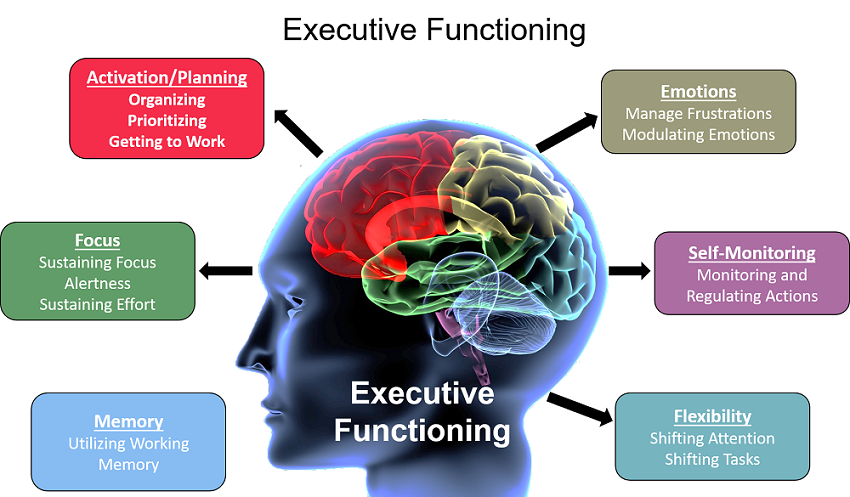
— — If bailiff closed the enforcement proceedings under article 46, what will happen next When will the enforcement proceedings be closed after payment? If you made the last payment and fully repaid the debt, then the FSSP are required to immediately complete the enforcement proceedings as soon as the money arrives in their account or the details of the plaintiff.
What happens after the closing of enforcement proceedings?
On the completion of enforcement proceedings the bailiff - executor issues a decision indicating the fulfillment of the requirements contained in the executive document, in whole or in part, or their non-fulfillment.
How long does it take to update the FSSP database?
You can also find out the telephone number of the specified bailiff-executor from the "Telephone Directory". Speaking about the relevance of the information contained in the "Data Bank", it is worth noting that update base occurs every 4 hours.
When is enforcement proceedings closed?
How long after payment If the debtor spent the last tranche and fully repaid the debt, the Federal Bailiff Service is obliged to complete enforcement proceedings immediately after the funds are credited to the account of the FSSP or the applicant. IP ends on the basis of Art. 47 FZ No. 229.
How to close enforcement proceedings in the FSSP?
Enforcement proceedings may be terminated by a bailiff in the following cases: When is enforcement proceedings considered completed?
Enforcement proceedings are considered completed from the moment the recoverer returned the executive document , about which the bailiff had to issue a decision.
When does enforcement proceedings end?
No. 229-FZ, enforcement proceedings ends with a bailiff in the following cases: 1) the actual fulfillment of the requirements contained in the executive document . 3) return to the recoverer of the executive document on the grounds established by Art.
How often is the traffic police database updated?
The draft law, in particular, establishes a deadline for updating data in the automated information system for ensuring road safety, on the basis of which FIS STSI has been operating since August 1, 2016. It is proposed to make adjustments every 10 days.
Why did the court debt disappear at public services?
This most likely means that the bailiff completed the enforcement proceedings under Art. 46 FZ -229(did not find the property of the debtor).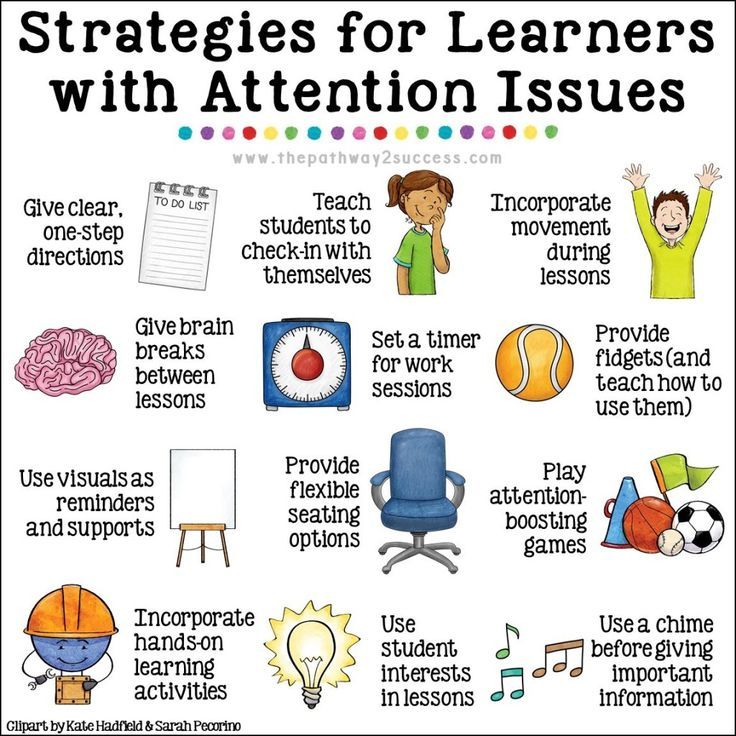 At the same time, the bailiff sent executive document judicial document to the recoverer.
At the same time, the bailiff sent executive document judicial document to the recoverer.
How long does it take for bailiffs to receive money?
Bailiffs transfer funds within 5 business days from the moment they are credited to the account of the structural unit. Art. 110 of the Law "On Enforcement Proceedings" establishes the period and sequence of collection of funds.
What does Article 46.1 3 mean?
This is means , that the case on enforcement proceedings was terminated (closed) against the debtor, and all restrictions imposed by the bailiff (arrest, restriction on travel outside the Russian Federation, prohibition of registration actions, etc.) are also removed.
How long can enforcement proceedings hang?
The statute of limitations established for bailiffs is referred to differently in the law: “the deadline for presenting enforcement documents for execution” (Article 21 of the Law on enforcement proceedings No.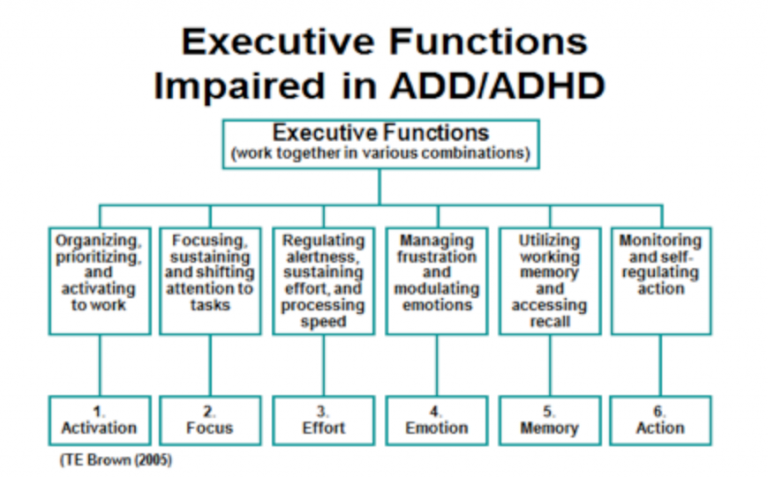 229-FZ dated 02.10.2007). In general, it also lasts 3 years.
229-FZ dated 02.10.2007). In general, it also lasts 3 years.
How long can enforcement proceedings take?
The limitation period for enforcement proceedings
The limitation period for presenting a writ of execution for collection is 3 years, by virtue of Art. 196 of the Civil Code of the Russian Federation and Art. 21 of the Federal Law "On Enforcement Proceedings " No. 229-FZ dated 02.10.2007
How to apply for the termination of enforcement proceedings?
Application for termination of enforcement proceedings is filed with the court in the area where the execution takes place by the bailiff. When applying to the court, the applicant does not pay the state fee. According to Article 440 of the Code of Civil Procedure of the Russian Federation, the court must consider application within 10 days.
When is the bailiff obliged to terminate enforcement proceedings?
Enforcement proceedings are terminated by a bailiff - executor in the following cases: 1) adoption by the court of an act on termination execution of the executive document issued by him. For example, this may be the cancellation of a court ruling on securing a claim; 2) acceptance by the court of the debtor's refusal to collect.
For example, this may be the cancellation of a court ruling on securing a claim; 2) acceptance by the court of the debtor's refusal to collect.
How to cancel a writ of execution from bailiffs?
To revoke writ of execution , you need to provide an appropriate application to the special unit of the bailiff , which conducts enforcement proceedings, the application is also called - on the recall of writ of execution .
Actual problems of enforcement proceedings at the present stage
Authors : Kononov Andrey Anatolievich, Ugryumov Ivan Nikolaevich, Moskovets Anna Ivanovna
Category : Jurisprudence
Posted by in young scientist #42 (384) October 2021
Publication date : 10/15/2021 2021-10-15
Article viewed: 955 times
Download electronic version
Download Part 2 (pdf)
References:
Kononov, A.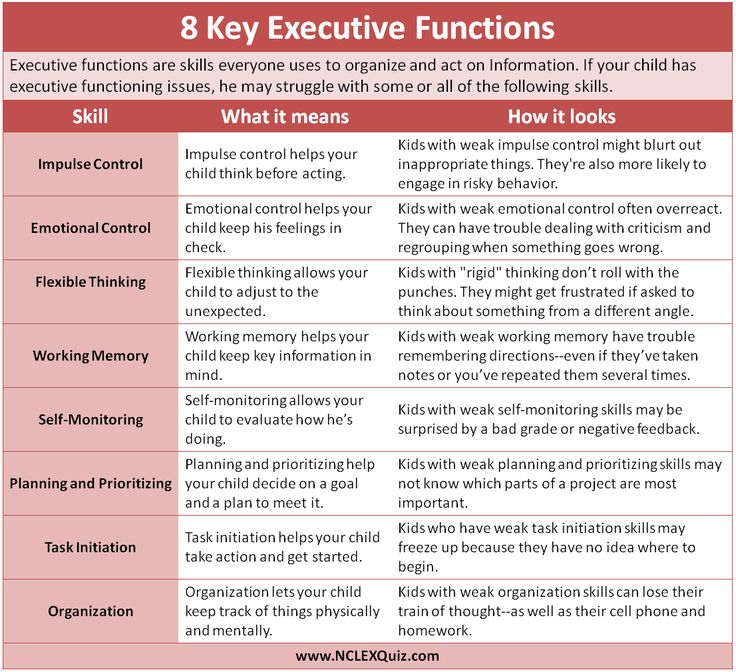 A. Actual problems of enforcement proceedings at the present stage / A. A. Kononov, I. N. Ugryumov, A. I. Moskovets. - Text: direct // Young scientist. - 2021. - No. 42 (384). - S. 95-96. — URL: https://moluch.ru/archive/384/84617/ (date of access: 08.12.2022).
A. Actual problems of enforcement proceedings at the present stage / A. A. Kononov, I. N. Ugryumov, A. I. Moskovets. - Text: direct // Young scientist. - 2021. - No. 42 (384). - S. 95-96. — URL: https://moluch.ru/archive/384/84617/ (date of access: 08.12.2022).
The article discusses the concept and essence of enforcement proceedings, analyzes the problems of legal regulation of the legal institution in question at the present stage.
Keywords: enforcement proceedings, problems of enforcement proceedings, enforcement of judgments, bailiff, enforcement officer, writ of execution, enforcement system
Enforcement proceedings are the enforcement of the requirements contained in executive documents. Such documents are issued by courts, other bodies or officials who have the right to oblige a person to transfer money (other property) to another person, to perform certain actions in his favor or to refrain from them.
Enforcement proceedings are conducted by the bailiff service (FSSP). In this case, the bailiff must be guided by the principles of conducting proceedings. The legal requirements of the bailiff are subject to strict execution (Articles 4, 6 of the Law on Enforcement Proceedings [5]).
The legislation on enforcement proceedings is based on constitutional norms that guarantee state, including judicial protection of the rights and freedoms of man and citizen (Article 45 Part 1, Article 46 Part 1 and 2) [1].
In order for the protection of violated rights to be carried out at the proper level, the law enforcement act must be executed in a timely manner.
The legislation on enforcement proceedings primarily includes (Article 3 of the Law on Enforcement Proceedings):
Law on Enforcement Proceedings. It is the basic law governing the entire enforcement process. It applies regardless of which court or body issued the writ of execution. The norms of other laws establishing the procedure for compulsory execution must comply with it;
procedural codes (Arbitration Procedural Code of the Russian Federation [2], Civil Procedure Code of the Russian Federation [3], Code of Administrative Procedure of the Russian Federation [4]).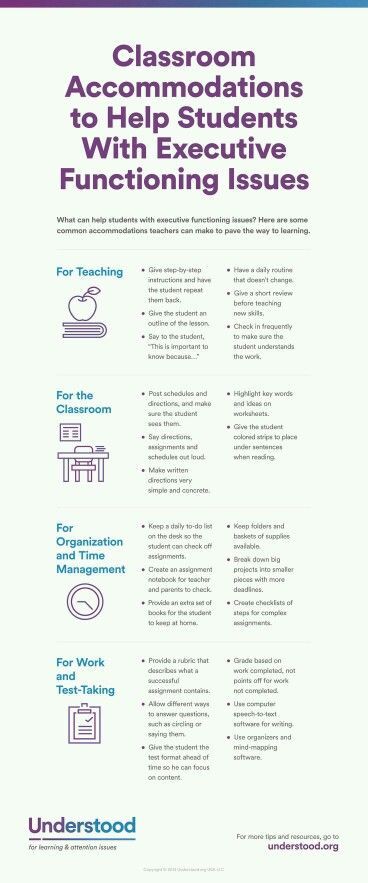 They regulate those aspects of enforcement proceedings in which the court is involved. For example, the procedure for issuing executive documents, suspending enforcement proceedings, restoring the deadlines for presenting a writ of execution;
They regulate those aspects of enforcement proceedings in which the court is involved. For example, the procedure for issuing executive documents, suspending enforcement proceedings, restoring the deadlines for presenting a writ of execution;
other federal laws. In particular, this is the Law on Bailiffs. It mainly regulates the organization of the activities of the bailiff service and guarantees for their protection. However, it contains some important provisions for the parties. For example, Art. 12 of this Law contains a list of rights and obligations of bailiffs;
regulations. Usually they regulate certain issues of ensuring enforcement proceedings. For example, Decree of the Government of the Russian Federation of July 21, 2008 No. 550 approved the rules for returning the performance fee to the debtor [6].
The enforcement process is also regulated by the acts of the FSSP. Usually these are orders and methodological recommendations, which are not regulatory legal acts, but are mandatory for bailiffs.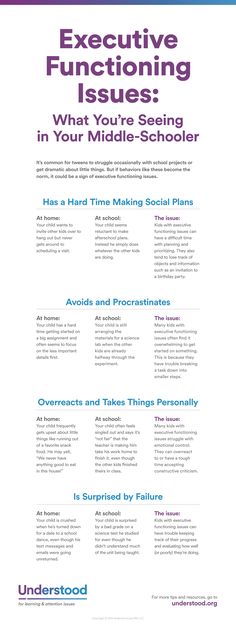 The courts also take them into account. For example, this is an Order on the approval of exemplary forms of procedural documents, Guidelines for the organization and production of an executive search in the FSSP.
The courts also take them into account. For example, this is an Order on the approval of exemplary forms of procedural documents, Guidelines for the organization and production of an executive search in the FSSP.
As N. V. Barbashova rightly notes, “today, the activities of the justice and judicial authorities are one of the key areas in the law enforcement sphere of any state. Their activity contributes to the preservation of internal stability in the country, influences the formation of a public perception of the fidelity of the domestic policy chosen by the state, including in the field of state security. Against this background, the recent efforts by the state to implement reforms in the system of justice and judicial bodies are natural. In the field of legal regulation, scientific and theoretical understanding and justification of legislative changes in the field of ensuring the economic security of the state, including with the aim of further improving the efficiency of legal regulation of legal relations in this area, is of great importance” [Barbashova N.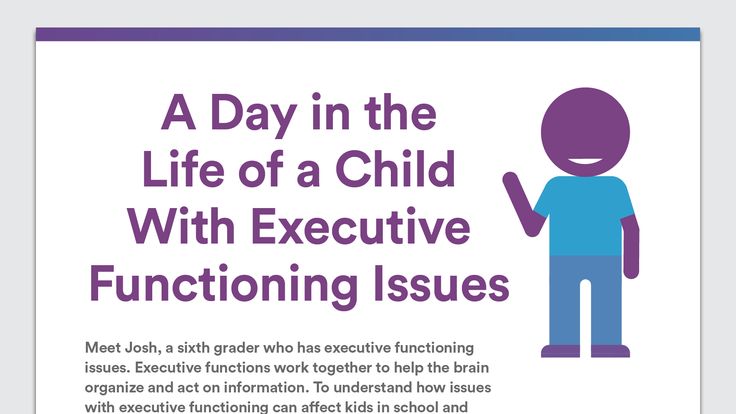 V., p. 126].
V., p. 126].
One of the problems of enforcement proceedings today is the extremely low enforcement of court decisions. A feature of this problem is that Federal laws were adopted to improve the enforcement of judicial acts, but due to gaps in the wording and direct contradiction to other regulatory legal acts (for example, the Civil Code, the Civil Procedure Code, the Arbitration Procedure Code), the recovery process has become more complicated. One of the parties to enforcement proceedings may abuse its right. The debtor may maliciously fail to comply with the provisions of the law or create obstacles to its implementation (alienation of property subject to collection, concealment of income, etc.). By his actions, the debtor can influence the amount of the recovered property or make the recovery impossible at all. The debtor can to some extent use the law for his own benefit - the property necessary for the implementation of professional activities cannot be recovered in favor of the claimant.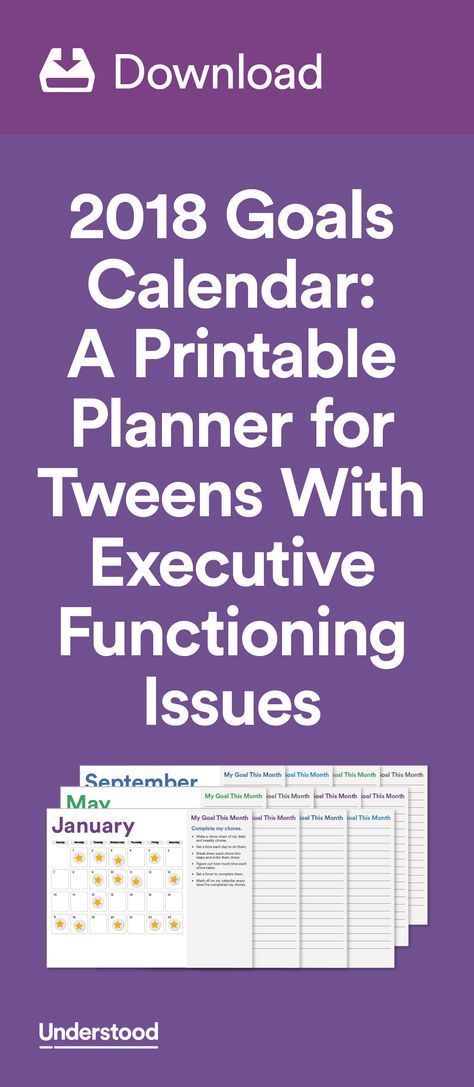 The debtor retains his property, which can be sold, since some property can be a means of earning money (which is not always true). The recoverer cannot recover the debt [Kesaeva, p. 141].
The debtor retains his property, which can be sold, since some property can be a means of earning money (which is not always true). The recoverer cannot recover the debt [Kesaeva, p. 141].
It is also unacceptable to partially fulfill the requirements of the executive document. Concealment of property, destruction, dubious transactions (donation, registration for strangers, other persons), property with low liquidity. The law contains a list of property that cannot be foreclosed, but there is no clear list indicating what kind of property can be seized.
It seems possible to agree with the proposal expressed in legal science to reform the current legislation on enforcement proceedings by creating a codified act that will correct all existing gaps and conflicts, and will also contain better regulation of enforcement proceedings [Khronin N. V., p. 197]. It is necessary to improve the performance of bailiffs, for which, in our opinion, it is necessary to increase the number of employees and pay attention to their qualifications.
We believe that these changes will contribute to an increase in the efficiency of the bailiff service, which in turn will ensure the proper implementation of court decisions.
Literature:
- Constitution of the Russian Federation: adopted by popular vote on 12.12.1993 with amendments approved during the all-Russian vote on 07/01/2020 // Collection of Legislation of the Russian Federation. - 2020. - No. 11. - Art. 1416.
- Arbitration Procedure Code of the Russian Federation of July 24, 2002 No. 95-FZ (as amended on July 1, 2021, as amended on July 22, 2021) // Collection of Legislation of the Russian Federation. - 2002. - No. 30. - Art. 3012.
- Civil Procedure Code of the Russian Federation dated November 14, 2002 No. 138-FZ (as amended on July 1, 2021) // Collection of Legislation of the Russian Federation. - 2002. - No. 46. - Art. 4532.
- Code of Administrative Procedure of the Russian Federation of March 8, 2015 No.
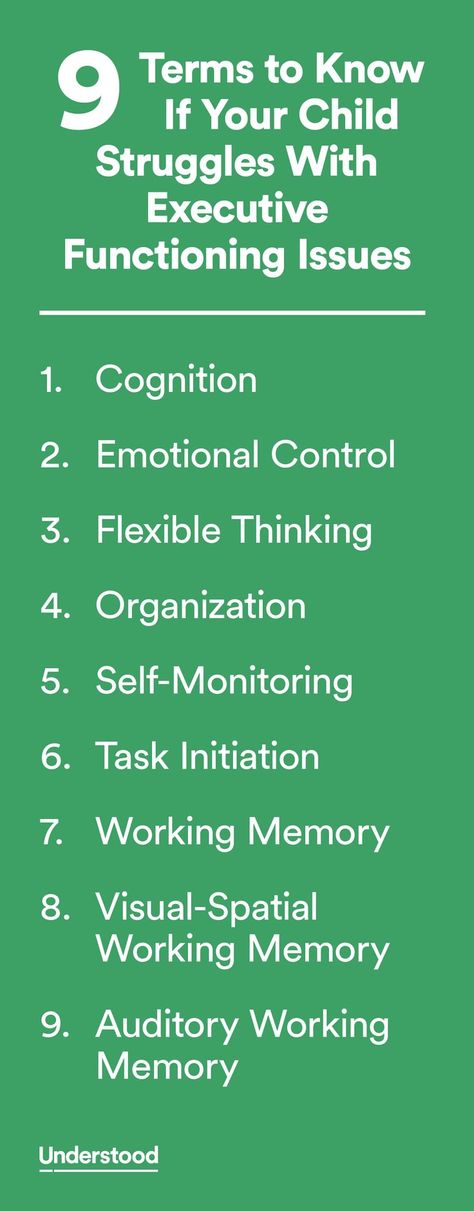 21-FZ (as amended on April 30, 2021, as amended on July 15, 2021) // Collection of Legislation of the Russian Federation. - 2015. - No. 10. - Art. 1391.
21-FZ (as amended on April 30, 2021, as amended on July 15, 2021) // Collection of Legislation of the Russian Federation. - 2015. - No. 10. - Art. 1391. - Federal Law of October 2, 2007 No. 229-FZ (as amended on December 30, 2020) “On Enforcement Proceedings” // Collection of Legislation of the Russian Federation. - 2007. - No. 41. - Art. 4849.
- Decree of the Government of the Russian Federation of July 21, 2008 No. 550 “On approval of the Rules for the return to the debtor of the performance fee” // Collection of Legislation of the Russian Federation. - 2008. - No. 30 (part 2) .- Art. 3636.
- Barbashova, N.V. On the role of the Federal Bailiffs Service in ensuring economic security / N.V. Barbashova. – Text: direct // Bulletin of the Student Scientific Society of the State Educational Institution of Higher Professional Education "Donetsk National University". - 2021. - T. 4. - No. 13. - P. 126–130.
- Kesaeva, V. A. Features of the problems of enforcement proceedings.
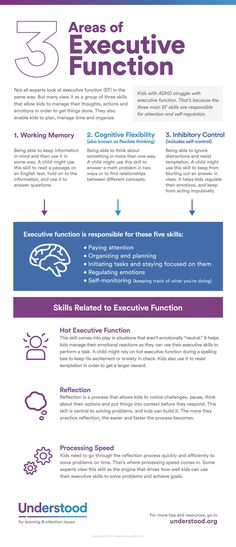 - Text: direct / V. A. Kesaeva // Law and the state: theory and practice. - 2021. - No. 3 (195). - P. 141–142.
- Text: direct / V. A. Kesaeva // Law and the state: theory and practice. - 2021. - No. 3 (195). - P. 141–142. - Khronin, N.V. On some problems of enforcement proceedings / N.V. Khronin, A.V. Ponomarev. — Text: direct // Modern Science.- 2021.- No. 2–2.- P. 194–197.
Basic terms (automatically generated) : enforcement proceedings, writ of execution, enforcement, bailiff, act, Arbitration Procedure Code, Barbashovo, Civil Procedure Code, legal regulation, RF.
Keywords
executive proceedings, executive system, execution of judgments, performance list, execution problems, bailiff performerenforcement proceedings, problems of enforcement proceedings, enforcement of judgments, bailiff, enforcement officer, writ of execution, enforcement system
Similar articles
Forms
enforcement judgments, executors. ..
.. In RF , as in many foreign countries, executive production , associated
Also, by resolution of the Plenum of the Supreme Arbitration Court of the Russian Federation dated June 22, 2006 No. 23, clarifications were given
Common for executive proceedings decisions arbitration courts and for executive ... Executive production in Russian Federation
Civil procedural code Russian ...
It is stated that executive proceedings on the territory of the Russian Federation is directly the subject of regulation of executive law, without which the functioning of the Russian legal system is currently impossible .
Some problems
executive production ...Key words: executive proceeding , bailiff - executor.
They believe that Executive Production is an independent Legal
In addition, executive and Civil ( Arbitration ) Problematic issues of complete and correct version ...
Forced Fulfillment Court Acts , Acts other bodies and officials in
Along with Civil process, where the defendant and the plaintiff have a fairly extensive volume of
by bailiffs - the bailiffs are applied by the bailiffs. measures aimed at...
Current issues of judicial protection of the rights of participants.
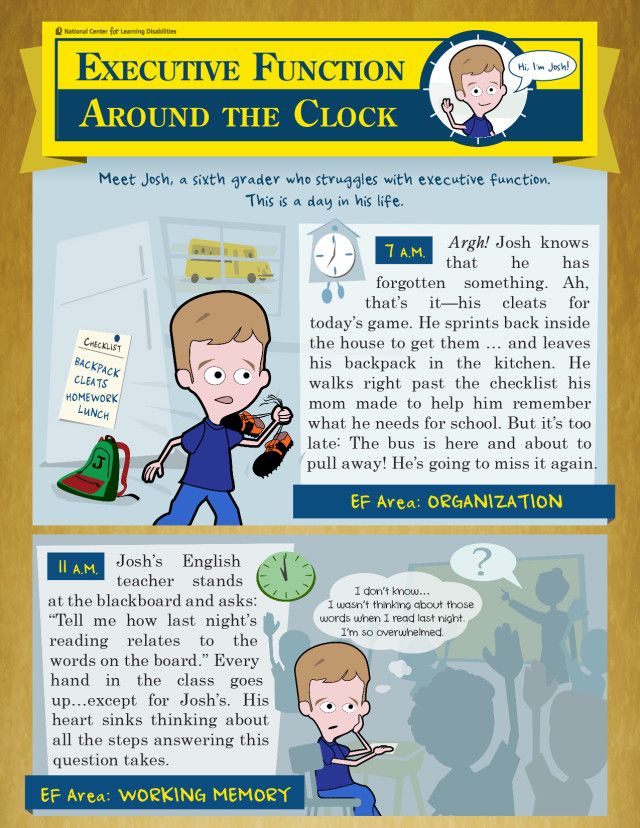 ..
.. of the normative- legal regulation Executive production It follows that the state-formed and independent bailiffs (FSSP of Russia ) is the main body of the compulsion of the execution of the execution of the execution ...
Directions for improvement
executive productionAccording to Civil Procedure Code RF The court decision is a decree of the court of first instance, the result of
Regulation in the field of Acts Acts of the Acts .
On the need to amend the legislation on...
The history of executive production in Russia dates back to the 16th century. For such a long time of its existence, the powers to ensure the execution of decisions of judicial and other bodies were transferred from the judiciary to the executive
For such a long time of its existence, the powers to ensure the execution of decisions of judicial and other bodies were transferred from the judiciary to the executive
Similar articles
Forms
enforcement judgments, executors...V RF , as in many foreign countries, Executive Production , connected
Also by the resolution of the Plenum of you RF dated June 22, 2006 No. 23 were given explanations
General for Executive Arbitrate courts and for executive ...
Executive production in Russian Federation ...
Place
executive production in system Russian .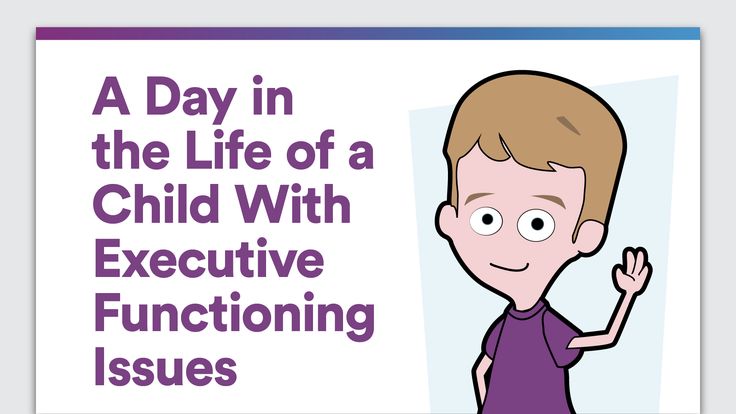 ..
.. It is stated that executive proceedings on the territory of the Russian Federation is directly the subject of regulation of executive law, without which the functioning of the Russian is currently impossiblelegal system.
Some problems
executive production ...Key words: executive proceeding , bailiff - executor.
They believe that executive proceedings is independent legal
In addition, executive proceedings and civil ( arbitration ) the process of a unified ...
Problematic issues of complete and correct execution of
.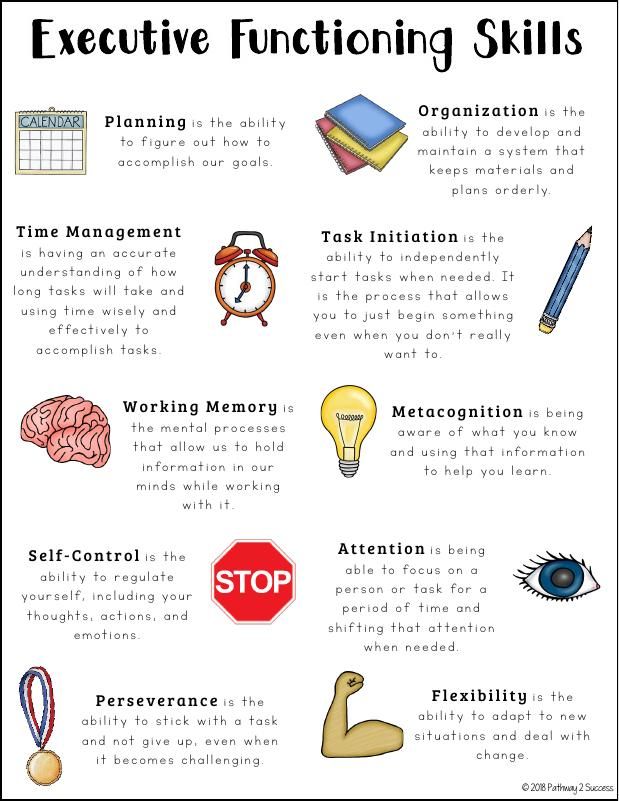 ..
.. Forced Fulfillment Court Acts , Acts other bodies and officials in
Along with Civil process, where the defendant and the plaintiff have a fairly extensive volume of
by bailiffs - the bailiffs are applied by the bailiffs. measures aimed at...
Current issues of judicial protection of the rights of participants...
of the normative- legal regulation Executive production It follows that the state-formed and independent service of the bailiff (FSSP of Russia ) is the main body of the compulsion of the execution. ...
Areas for improvement
enforcement judgments of the Federal...According to Civil Procedure Code RF The court decision is a decision of the court of first instance, the result of
to regulation .